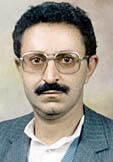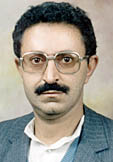
Ibrahim Abdul-Habeeb: “The law is the final arbiter in our relations with the media.” [Archives:1999/05/Interview]
February 1 1999
Relations between the government bodies responsible for controlling the flow of information on the one hand, and the media on the other hand, are at best strained, because of the conflict of interest. That is why the job of the Directorate General for the Press at the Ministry of Information a difficult one.
It is this governmental body that is often used by the authorities to pin down the press. More often than not, decision is external to the directorate general, but it becomes the conduit to bring pressure to bear on the media.

Excerpts:
Q: What exactly is the duty of your directorate-general.
A: The law regulates our responsibilities. Based on by-law (95) of 1998, the main duties are:
1. To license issuance of new newspapers and magazines;
2. To review the performance of newspapers and magazines in Yemen and report on them;
3. To inspect the contents of foreign newspapers and magazines and regulate their circulation inside Yemen;
4. To inspect requests for ID cards by journalists;
5. To assess requests for opening media offices and distribution points and to approve agency arrangements;
6. To ensure availability (to the authorities) of any foreign newspapers and magazines that are not in circulation in Yemen;
7. To arrange and organize press conferences of the senior officials of the state of Yemen, as well as for visiting dignitaries;
8. To coordinate with the legal department to assure a full implementation of the press law and other relevant laws;
9. To perform other tasks ordered by the ministry.
Q: How do you assess press freedom in Yemen today?
A: The main problem we have in achieving a meaningful press freedom is the inability of journalists to adhere to the law. Some journalists believe that press freedom is equal to chaos and confusion.
IN my opinion, any right can only be exercised if the corresponding duties are observed. In other words, journalists may print information they can prove in court; otherwise, they can be held responsible for publishing false information or at least misinformation.
Regarding an overall assessment, I can say that many of Yemen’s journalists do not have adequate training or even comprehension concerning their role. They abuse their powers to achieve illegal ends. The direct result of this is that many segments of society today look at the media with suspicion. I can even say that some circles are beginning to despise the sector.
Our job is to curb such behavior and to reign in the few journalists who are giving the sector a bad name. We tell them that they have to work within the law.
Q: Some independent and opposition newspapers accuse your ministry of trying to curb press freedom. How do you respond?
A: This is not true. The law is the arbiter in the relations between the ministry and the media.
We do not mind constructive or objective criticism. We do believe that there may be some shortcomings in our work. We would like feedback to help us improve our performance. But, we do not think that sensationalism helps anybody.
We ask editors and journalists to respect the principles of the Revolution, the constitution, the laws and the supreme interests of Yemen. Beyond that, they are free to write as they want.
Let me use an example. The country today is the target of international terrorism and extremism. We expect all Yemenis, not just journalists, to see that this fight concerns everybody. We should all join hands to stand up against these terrorists and extremists.
I can give you another example. Nation-building requires a hopeful and positive public attitude. The opposition media almost inadvertently sows the seeds of frustration among our people. Issue after issue, they simply push a bad and negative attitude as if nothing good or right takes place in Yemen. The starting point for them is a confused notion of opposing the ruling regime. While that is legitimate for opposition politicians and their journalists, they end up being in opposition to the nation and society.
What I am saying is that there is a double responsibility that journalists shoulder. There is a responsibility to the profession, and there is a responsibility to the nation.
Q: The new by-law issued in 1998 is allegedly aimed at reducing the number of newspapers and magazines. How is that implemented?
A: It is hard to argue what the intentions of the laws are. A law is a law and it must be obeyed, even if some people do not like it. But, the by-law number 95 was issued by the minister of information in 1998 in order to clarify some points in the Press Law number 25 of 1990.
Let me refer to some specific articles in this by-law in order to shed light on the limitations it imposes on journalism, as some people allege.
First, the by-law does not really affect newspapers, magazines and newsletters issued by political parties and NGOs.
Second, Article 5 stipulates the financial requirements for any media publication as follows:
– The paid-up capital of a daily newspaper must be a minimum of YR 2 million.
– The paid-up capital of a weekly newspaper must be a minimum of YR 700,000.
– The paid-up capital of a weekly magazine must be a minimum of YR 1.2 million.
– The paid-up capital of a monthly magazine must be a minimum of YR one million.
-The paid-up capital of an advertisement newsletter is YR 100,000.
Third, Article 9 stipulates that any application for a new newspaper or magazine should provide the ministry with a valid bank guarantee of YR 100,000.
It also stipulates that the applicant should pay 5% of the project’s capital to the ministry in order to get the license.
It further stipulates that the annual renewal of the license entails payment of 1% of the newspaper’s/magazine’s capital to the ministry.
The by-law gives the minister the right to waive in full or in part such payments.
Q: What action does the law empower you to take if a newspaper is issued without permit?
A: We do not have cases of people venturing to issue newspapers without adequate legal cover. But the basic action is to impound any such publication – by decision from the minister – and then refer the matter to the courts. Article 107 refers to this action as administrative impounding while awaiting a court decision. Furthermore, the property of such illegal publication is confiscated. The owner may refer to the courts.
Q: How do you see the growth of independent newspapers?
A: I am afraid the record is not a happy one. We now have many of these independent publications which falter. There are two basic reasons for this:
a) They have an inherent financial difficulty. In most cases, an individual or group are able to secure basic capital to launch a paper, but they fail to generate a steady flow of income from the paper itself. Thus, one issue comes out, and then they skip an issue, and so on.
b) There is a lack of vision regarding the business and how it is managed. Journalism is a very demanding job, and it requires that the papers have a clear vision of what they want to accomplish and where they want to go. This problem is further complicated by the fact that the papers are often managed by people who have many other jobs and responsibilities. I now of some cases where the chief editor or the top person does not show up at the newspaper for long periods.
Q: Let me ask you about a specific case. You have suspended the circulation of Al-Rai Al-Aam newspaper. What are the reasons?
A: Yes, we have put this newspaper out of temporary circulation and there is a case pending with the courts on this matter. The judge will decide.
The problem with this paper is that it publishes information it receives from stringers without checking and double checking. Thus it gets in trouble with the law because of the wrong information it carries.
——
[archive-e:05-v:1999-y:1999-d:1999-02-01-p:./1999/iss05/intrview.htm]


